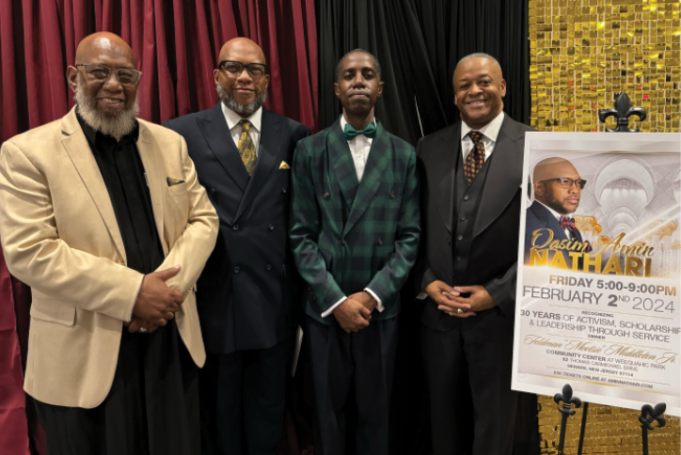by Yaminah Muhammad
NEWARK—For many who serve the community, the righteous recognition of the fruits of their labor at times only comes after they are gone. However, for the family, friends and peers of Imam Qasim Amin Nathari, allowing him to reap said fruits of his labor was a must.
After over 30 years of community service, dozens gathered in the Feldmen “Mootsie” Middleton Jr. Community Center on February 2, to recognize the activism, scholarship and leadership of Imam Nathari. The gathering allowed him to experience what many others never have—the gratifying love, appreciation and gratitude of those whose lives he positively impacted.
“It reminds me of what my grandmother used to say, ‘give me my roses while I’m alive.’ Insha’Allah (God-Willing), we will all make our return to Allah one day, but we want to celebrate Brother Nathari now so that he knows he’s appreciated, and it’s not just shown at his janazah,” Masjid As-Habul Yameen organizer and member Zainab Abdul-Zahir said.
“I’ve known Brother Nathari for many years, and he’s worked hard and constantly to better the community. So, I wanted to be a part of his recognition,” she continued.

Similar to Abdul-Zahir, Student Minister Abdul Salaam Muhammad of Mosque No. 6 in Baltimore, Maryland, also spoke to the importance of recognizing Imam Nathari for his good works. “I’ve learned from my leader and teacher, the Honorable Minister Louis Farrakhan from the Most Honorable Elijah Muhammad, that we must learn to appreciate, not worship, but give appreciation to our fellow brothers and sisters. That’s the basis of restoring true Black love among us who have hated ourselves,” he told The Final Call.
“So, when somebody gives a dedicated work and contribution, like Brother Imam Nathari has … it’s so important that we honor their dedicated work,” added Student Minister Abdul Salaam Muhammad, also the second imam appointed by Minister Farrakhan to the Nation of Islam.
Imam Qasim Amin Nathari’s work started on Sunday, October 10, 1993, when he accepted an invitation to speak at Masjidullah, the original Muhammad Mosque No. 80 in Plainfield, New Jersey. This ignited the fire in him of love for community service with a concentration in Islamic affairs. Consequently, this led him down the path of impacting Islam in America on a national level.
As a result, Imam Nathari has spent the last three decades contributing to how Islam is understood, practiced and represented across North America.
Some of his many contributions to Islam in America include aiding in the establishment of Masjid As-Habul Yameen in East Orange, New Jersey, authoring 10 published books on Islam, speaking at over 100 masjids/mosques, centers, colleges and universities, and lecturing on contemporary Islamic issues on nationally broadcasted television, radio programs and podcasts.
Additionally, Imam Nathari has also raised millions of dollars in support of various masjids/mosques, centers and organizations, and served as a featured contributor for various media outlets and research projects on Islam in America.
In 2008, Imam Nathari transitioned into a new phase of his work—broad civic engagement and results-oriented dialogue. In doing so, he established the Islam in America Movement (IAM). Just seven years later, during Ramadan 2015, he then launched the education entity of IAM, Muslim Empowerment Institute (MEI).
With each charitable contribution, Imam Nathari demonstrated his deep-rooted love for community and Islam, all of which warrants recognition and further establishes the oftentimes overlooked contributions of Black people to Islam.
“There has been an attempt to erase the Black contribution to Islam, but what people have to understand is that Black people did not just contribute to the Islam, we originated Islam. So, it’s our job as Black people to tell our story, to make sure that our narrative does not get erased because what we have seen more broadly than the Islamic perspective is that there has been an attempt to erase the Black contribution to humanity.
So, this dinner right here personifies that,” journalist Doshon Farad said, referring to the importance of acknowledging Imam Nathari’s 30 years of service.
The dinner featured a black and gold scheme complete with complimentary table decorations. As the guests filed in, they were welcomed with the tunes of beautifully recorded music and a deliciously cooked meal with beverages, provided by Torchlight Event Services. As the guests filled their stomachs with food, Imam Nathari took the mic to express his gratitude and reflect on his years in service.
During which, he declared his work undone. “We know that for us [Muslims in the Nation of Islam], we don’t quit our post until properly relieved. And we understand properly relieved as when Allah calls you back to Him,” Imam Nathari said, vowing to service the community until his final breath.
Yet, while his work is not ending, it is pivoting in approach. Imam Nathari is now stepping into a more scholastic realm in his new phase of Islamic community service. In this new realm, he plans to shift his focus from the “masjid-based work,” of lecturing to a more hands-on approach in the community, particularly where the youth are concerned.
“Although we’ve done a lot of grassroots community-based work, a lot of that time has been spent in a masjid. I think right now the Muslim community in America is at a crossroads and we really have to reengage the community where we live because our presence is being missed. And, anytime we leave an area without our presence, we leave a void that could only be filled by evil.
So that’s where I want to focus my energy—trying to help prepare that young generation and just being of service so that the young generation have a template to look at and they won’t feel that they have to reinvent the wheel,” he said.













